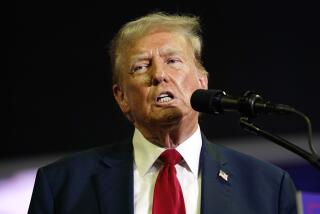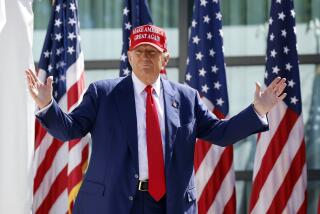Judge Bars Jurors From Testifying at Tampering Hearing
- Share via
In a ruling hailed by prosecutors but denounced by the defense, Superior Court Judge William L. Todd Jr. revealed Wednesday that he will not permit jurors to testify at a hearing next week on Mayor Roger Hedgecock’s motion for a new trial.
Late Wednesday, Todd ruled that only jurors’ sworn statements, not their testimony, will be allowed at next Monday’s hearing on jury-tampering allegations that are the basis of Hedgecock’s attorneys’ request that the mayor’s 13-count felony conviction be reversed.
However, while the judge’s ruling would dramatically limit the scope of the hearing, it apparently leaves open the possibility that court bailiffs--one of whom allegedly tampered with the jury during it deliberations--could testify.
“The hearing will be conducted upon the declarations of the 12 trial jurors and whatever other evidence is submitted by the parties at the time of the hearing,” Todd said in his two-page order. “The court will not hear testimony from any of the trial jurors.”
Hedgecock attorney Oscar Goodman, who argues that the jurors’ testimony, not simply their sworn declarations, is necessary to “see the full picture” surrounding the jury-tampering allegations, said that he was “amazed and very disappointed” by Todd’s decision.
“This darkens the pall . . . over the hearing,” said Goodman, who plans to ask the 4th District Court of Appeal to remove Todd from the case this week. “I’m absolutely astounded that the system isn’t permitting the truth to come out. This ruling will prevent all of the witnesses from telling everything they know and providing the full truth about these very serious charges. I’m shocked that things like this are happening in our legal system.”
However, Steve Casey, a spokesman for Dist. Atty. Edwin Miller, praised Todd’s decision, and took issue with Goodman’s contention that the ban on jurors’ testimony could make it more difficult to ascertain the facts about the jury-tampering charges. Miller had said earlier that prosecutors would oppose any testimony from jurors at the hearing, adding that the sworn statments would be “sufficient.”
“I suppose you’d get a fuller picture if you decided to stretch the hearing out for a few days and take testimony from everyone in San Diego,” Casey said. “But new trial motions are not intended to be vehicles by which you can relitigate the entire case. The (jurors’) statements tell what they know. There’s no need to drag them back into court and further harass them.”
In a related development, Kathy Saxton-Calderwood, one of two jurors who allege that bailiff Al Burroughs Jr. tampered with Hedgecock’s jury during its 6 1/2-day deliberations, filed a second sworn statement detailing those charges Wednesday. In the declaration, Saxton-Calderwood reiterated that Burroughs told the jurors a story about another trial pertaining to the crucial legal term of “reasonable doubt” and said that the bailiff “stated on more than one occasion that there were only two verdicts that could be reached--guilty or not guilty . . . He never mentioned the option of a hung jury.”
Todd’s ruling, combined with Saxton-Calderwood’s addition to her earlier sworn statement, continued the daily flurry of motions, briefs and court rulings that has characterized Hedgecock’s case since the jury-tampering allegations surfaced two weeks ago.
In sworn affidavits released Oct. 17, Saxton-Calderwood and attorney John Learnard, who represents juror Stanley J. Bohensky, alleged that Burroughs, in violation of court rules, talked on numerous occasions with jurors about the case and the progress in their deliberations. On Tuesday, Bohensky repeated those allegations in a new sworn statement after Todd described Learnard’s recitation of his client’s charges as “inadmissible hearsay.”
However, sworn documents from the 10 other jurors, filed by the district attorney’s office Monday, disputed those allegations, and were cited by Miller as proof that “there was not anything even remotely approaching jury tampering.”
Earlier this week, Todd rejected Goodman’s motion that the judge disqualify himself from ruling on the jury-tampering charges involving his own bailiff. Underlining that decision, Todd, in a separate order Wednesday, denied Goodman’s request that the judge reconsider removing himself from the case.
Contending that Todd’s decision to hear the new-trial motion creates “the appearance . . . of possible impropriety,” the mayor’s attorneys, in a motion expected to be filed today, plan to ask the 4th District Court of Appeal to disqualify Todd.
If Hedgecock loses his request for a new trial at Monday’s hearing, he could be ousted from office two days later, when Todd is scheduled to sentence Hedgecock on his conviction on 13 conspiracy and perjury counts stemming from allegedly illegal contributions to his 1983 mayoral campaign. The mayor faces a maximum sentence of eight years’ imprisonment.
Goodman conceded that the ban on jurors’ testimony is a serious blow to the defense’s hopes to overturn the conviction but added that he remains confident that “the (jury-tampering) evidence is so overwhelming . . . that it will overcome any procedural roadblocks.”
“This is a phenomenal handicap, no doubt about it,” Goodman said. “It’s impossible to glean the truth out of bald conclusionary statements and affidavits. It all comes down to a question of credibility, and you judge that by listening to and watching a person’s demeanor while he’s testifying, not by looking at words on a piece of paper.
“If you really want to get at the truth, I don’t understand why you’d do things this way. You’re limiting the information before you. You’re making it more difficult to find the truth.”
Under court procedures, during a jury’s deliberations, bailiffs act as a conduit of information between the jury and the judge, most often by relaying jurors’ questions about legal points or evidence to the judge. However, bailiffs are forbidden to discuss the case with jurors--a strict ban that Goodman argues that “no rational person can doubt” that Burroughs violated.
“As far as the law is concerned, with these facts, I’ve got to win the case--I absolutely have to win,” Goodman said. “There’s no way I can lose . . . if I can bring out the full picture. That’s my concern. This ruling sure doesn’t make that job any easier. That’s what’s so disappointing.”
Casey, though, argued that the jurors’ sworn statements “give the full picture.”
“The judge’s ruling certainly comports with our view that . . . you can get at the truth without having to vex or harass these jurors any more,” Casey said.
Goodman responded: “It’s not surprising that we’d disagree on this point. My interest is to do whatever is necessary to arrive at the truth in order to help my client. The prosecution’s interest is to hinder the truth-finding process in order to get themselves a mayor.”
Meanwhile, Saxton-Calderwood’s new statement, prepared in response to Todd’s characterization of her earlier sworn document as “conclusionary and . . . based on inadmissible hearsay,” reiterated her allegation that Burroughs frequently discussed the case with jurors while they were sequestered at a Mission Valley hotel.
Saxton-Calderwood pointed out that Burroughs told the jurors an anecdote that dealt with the definition of reasonable doubt--the now-celebrated “green hat story” in which jurors from another case got into a fistfight over disputed evidence. While most of the other jurors have said that they viewed Burroughs’ story as a joke, Saxton-Calderwood portrayed the anecdote as an explanation of a key legal point.
“References were made to the ‘green hat’ story during the deliberations,” Saxton-Calderwood’s statement said. “These references were generally made when I or other jurors thought a particular fact represented reasonable doubt.”
In response to some jurors’ claims that Saxton-Calderwood was out of earshot when Burroughs told the story, her statement Wednesday included a sketch depicting where she was seated in relation to the bailiff while the story was told.
Saxton-Calderwood also said that she once overheard Burroughs telling another juror that she and one other juror, Renee Ranck, “were holding up the deliberations.”
Burroughs also mentioned to her “the price of the rooms and the meals” at the hotel where the jurors were staying, Saxton-Calderwood wrote.
“At least one other juror said it would be a waste of taxpayers’ money if we didn’t reach a verdict,” she said.
On another occasion, Saxton-Calderwood said that she heard Burroughs remark that “Judge Todd was calling every day to see if we were making progress,” and that the bailiff and the judge “were good friends.”
More to Read
Sign up for Essential California
The most important California stories and recommendations in your inbox every morning.
You may occasionally receive promotional content from the Los Angeles Times.










